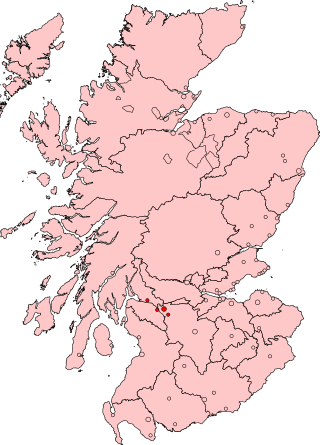Related Research Articles
Elgin Burghs was a district of burghs constituency of the House of Commons of Great Britain from 1708 to 1801 and of the House of Commons of the United Kingdom from 1801 to 1918. Until 1832, when Peterhead was added, the constituency comprised the parliamentary burghs of Elgin, Cullen, Banff, Inverurie and Kintore, lying in Elginshire, Banffshire and Aberdeenshire.
Aberdeenshire was a Scottish county constituency of the House of Commons of the Parliament of Great Britain from 1708 to 1800 and of the House of Commons of the Parliament of the United Kingdom from 1801 until 1868.
Ayrshire was a county constituency of the House of Commons of the Parliament of Great Britain from 1708 to 1800 and of the House of Commons of the Parliament of the United Kingdom from 1801 until 1868, when it was divided into North Ayrshire and South Ayrshire.
Anstruther Burghs was a district of burghs constituency of the House of Commons of the Parliament of Great Britain from 1708 to 1800 and of the House of Commons of the Parliament of the United Kingdom from 1801 to 1832.
Sutherland was a Scottish constituency of the House of Commons of the Parliament of Great Britain from 1708 to 1801 and of the Parliament of the United Kingdom from 1801 to 1918.
Edinburghshire was a Scottish county constituency of the House of Commons of the Parliament of Great Britain from 1708 to 1801 and of the Parliament of the United Kingdom from 1801 to 1918.
Haddington Burghs was a Scottish district of burghs constituency of the House of Commons of Great Britain from 1708 to 1801 and of the House of Commons of the United Kingdom from 1801 until 1885. It elected one Member of Parliament (MP) using the first-past-the-post voting system.
Fife was a county constituency represented in the House of Commons of the Parliament of the United Kingdom from 1708 until 1885, when it was divided into East Fife and West Fife.
Inverness Burghs was a district of burghs constituency of the House of Commons of the Parliament of Great Britain from 1708 to 1801 and of the Parliament of the United Kingdom from 1801 to 1918. It elected one Member of Parliament (MP).
Inverness-shire was a county constituency of the House of Commons of the Parliament of Great Britain from 1708 to 1801 and of the Parliament of the United Kingdom from 1801 until 1918.
Kilmarnock Burghs was a district of burghs constituency of the House of Commons of the Parliament of the United Kingdom from 1832 to 1918. It elected one Member of Parliament (MP) by the first-past-the-post voting system.
Dunbartonshire was a county constituency of the House of Commons of Great Britain from 1708 to 1801 and of the House of Commons of the Parliament of the United Kingdom from 1801 to 1950.
Caithness was a county constituency of the House of Commons of the Parliament of Great Britain from 1708 to 1801 and of the Parliament of the United Kingdom from 1801 to 1918.
Buteshire was a county constituency of the House of Commons of the Parliament of Great Britain from 1708 to 1801 and of the Parliament of the United Kingdom from 1801 to 1918.
Stirling Burghs was a district of burghs constituency of the House of Commons of the Parliament of the United Kingdom from 1708 to 1918.
Ayr Burghs was a district of burghs constituency of the House of Commons of the Parliament of Great Britain from 1708 to 1800 and of the House of Commons of the Parliament of the United Kingdom from 1801 to 1950. It elected one Member of Parliament (MP), using the first-past-the-post voting system.

Perth Burghs was a district of burghs constituency of the House of Commons of the Parliament of Great Britain from 1708 to 1801 and of the Parliament of the United Kingdom from 1801 until 1832, representing a seat for one Member of Parliament (MP)

Clyde Burghs, also known as Glasgow Burghs, was a district of burghs constituency of the House of Commons of Great Britain from 1708 to 1801 and of the House of Commons of the United Kingdom from 1801 to 1832. It elected one Member of Parliament (MP).
Perthshire was a Scottish county constituency of the House of Commons of the Parliament of Great Britain from 1708 to 1801 and of the Parliament of the United Kingdom from 1801 until 1885, representing a seat for one Member of Parliament (MP).
References
- ↑ "Renfrewshire". History of Parliament Online (1690-1715). Retrieved 9 June 2019.
- ↑ "Renfrewshire". History of Parliament Online (1715-1754). Retrieved 9 June 2019.
- ↑ "Renfrewshire". History of Parliament Online (1754-1790). Retrieved 9 June 2019.
- ↑ "Renfrewshire". History of Parliament Online (1790-1820). Retrieved 9 June 2019.
- ↑ "Renfrewshire". History of Parliament Online (1820-1832). Retrieved 9 June 2019.
- ↑ Jenkins, Terry. "MAXWELL, John (1791-1865), of Pollok House, Renfrew and 10 Duke Street, St. James's, Mdx". The History of Parliament. Retrieved 8 May 2020.
- 1 2 3 4 5 6 7 8 9 Stooks Smith, Henry (1842). The Register of Parliamentary Contested Elections: Containing the Uncontested Elections Since 1830. London: Simpkin, Marshall, & Co. pp. 209–210. Retrieved 18 August 2019– via Google Books.
- ↑ "Election Proceedings" . Fife Herald. 15 July 1841. pp. 1–2. Retrieved 18 August 2019– via British Newspaper Archive.
- 1 2 Jenkins, Terry. "Renfrewshire". The History of Parliament. Retrieved 8 May 2020.
- 1 2 3 4 5 6 7 8 9 10 11 12 13 14 15 16 17 18 Craig, F. W. S., ed. (1977). British Parliamentary Election Results 1832-1885 (e-book) (1st ed.). London: Macmillan Press. pp. 600–601. ISBN 978-1-349-02349-3.
- ↑ "Page 4" . Fife Herald. 27 December 1832. Retrieved 8 May 2020– via British Newspaper Archive.